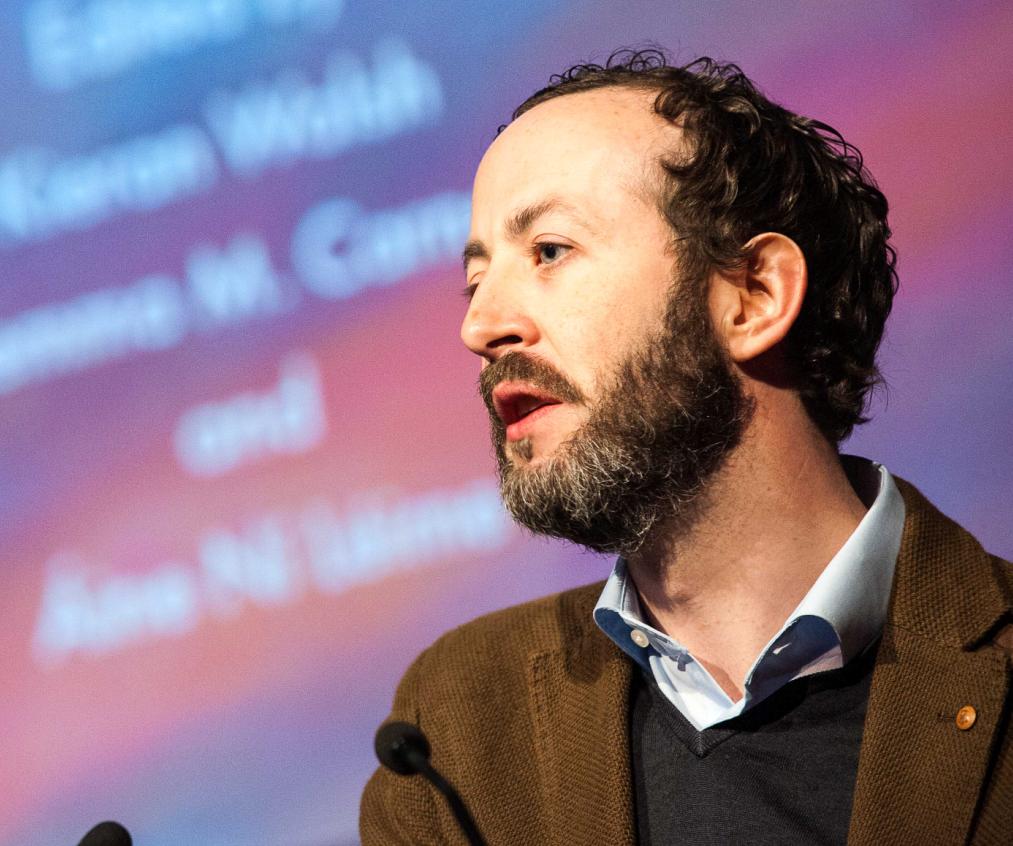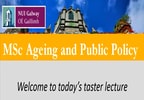-
Courses

Courses
Choosing a course is one of the most important decisions you'll ever make! View our courses and see what our students and lecturers have to say about the courses you are interested in at the links below.
-
University Life

University Life
Each year more than 4,000 choose University of Galway as their University of choice. Find out what life at University of Galway is all about here.
-
About University of Galway

About University of Galway
Since 1845, University of Galway has been sharing the highest quality teaching and research with Ireland and the world. Find out what makes our University so special – from our distinguished history to the latest news and campus developments.
-
Colleges & Schools

Colleges & Schools
University of Galway has earned international recognition as a research-led university with a commitment to top quality teaching across a range of key areas of expertise.
-
Research & Innovation

Research & Innovation
University of Galway’s vibrant research community take on some of the most pressing challenges of our times.
-
Business & Industry

Guiding Breakthrough Research at University of Galway
We explore and facilitate commercial opportunities for the research community at University of Galway, as well as facilitating industry partnership.
-
Alumni & Friends

Alumni & Friends
There are 128,000 University of Galway alumni worldwide. Stay connected to your alumni community! Join our social networks and update your details online.
-
Community Engagement

Community Engagement
At University of Galway, we believe that the best learning takes place when you apply what you learn in a real world context. That's why many of our courses include work placements or community projects.
Ageing and Public Policy (MSc)
Course Overview
NOTE: this course is now not on offer for entry 2024.
--
Aim
This Masters' in Ageing & Public Policy critically examines demographic ageing from a public policy perspective, and is driven by a commitment to research-led interdisciplinary education. It assesses existing approaches and future directions to secure effective and fair ageing societies.
This MSc is a new innovative, interdisciplinary programme that delivers sought after transferrable and topic specific skillsets, and which incorporates an applied project and placements at national public, NGO and private organisations. The MSc is available on a full-time or part-time basis and is intended to be delivered as both an in person or a remote access programme.
International Programme Distinctiveness
- First programme of its kind in Ireland, and one of the first that is available internationally.
- Hosted at an internationally recognised research centre—Irish Centre for Social Gerontology
- Delivered in collaboration with international policy experts.
Why Ageing, Why Now
- With the world’s older population projected to double by 2050, population ageing is recognised as a global challenge for sustainable development, and one of three major transformations facing the European Union, and the social, economic and health systems of its states.
- The Sustainable Development Goals 2030 Agenda and the forthcoming European Commission Green Paper on Ageing testify to how ageing can create sustainability and equity challenges in every major policy domain – social protection, health, finance, housing and environment, employment, etc.
- Despite extensive political commitment to finding innovative means to adapt to demographic change, existing efforts are often uncoordinated and ad-hoc with increasing evidence of growing inequalities amongst older populations.The COVID-19 pandemic has only further not only exposed weakness in ageing-related policy, but also the neglect of the diversity of needs and preferences of the ageing populations.
- There is a marked gap in graduate labour force skills, and capacity, to help public agencies, civil society organisations and private companies to address these challenges and to capitalise on the opportunities within ageing societies.
Graduate Skills
Provides topic specific and transferable skills sets including:
• In-depth knowledge of ageing related policy
• In-depth knowledge of public policy systems
• Capacity for critical thinking and theorizing
• Ability to assess and evaluate public polices
• Research, data and analytical methods
• Ability to apply data analysis techniques to real world policy challenges
Taster Session
Taster Session for the MSc in Ageing and Public Policy. Listen back>>
Areas which were covered in this session were:
- Dynamics of Ageing & Public policy
- International Policy & Ageing
- Work, Pensions and Retirement
- Social Exclusion and Inequalities in Later Life.
The Irish Centre for Social Gerontology
Mission
With a view to informing a holistic understanding of later life in public policy, the ICSG conducts research on ageing and the life course that responds to gaps in scientific knowledge, policy and practice, while promoting the diversity of ageing experiences.
International Research Expertise
- Social exclusion and inequality in later life
- Place and older people’s environmental context
- Work and retirement
- Health care services and infrastructure
Current Projects—For a list of current ICSG projects click here
Recent Publications—For a list of ICSG publications click here
Hear From Our Experts:
Click on this video to view some of the ageing-related public-policy work and messages that our programme lectures are involved with.
Applications and Selections
Applications are made online via the University of Galway Postgraduate Applications System.
Who Teaches this Course
Meet the lecturers: Ageing and Public Policy - lecturers

Irish Centre for Social Gerontology
Institute for Lifecourse and Society
University of Galway
View Profile

Irish Centre for Social
Gerontology
Cairns Building
NUI Galway
View Profile
Requirements and Assessment
Key Facts
Entry Requirements
Normally a H2.1 degree (NFQ Level 8 or equivalent) in a related social science discipline (e.g., economics; sociology; management; social work; policy orientated degrees) or a cognate field of study (e.g. health sciences; public health). IELTS score of 6.5 or equivalent, if applicable. Applications from people with commensurate experience in ageing-related policy and practice will also be considered
The MSc in Ageing and Public Policy offers a Recognition of Prior Learning (RPL) process and encourages applications from people with other forms of certified learning and experience, and who may not fulfil these requirements.
Additional Requirements
Recognition of Prior Learning (RPL)
Applicants who do not have the required academic qualifications for entry purposes may also be entitled to apply under the University’s Recognition of Prior Learning Policy. Further information is available from the Programme Director and on the University’s Recognition of Prior Learning website.
Duration
1 year, full-time; 2 years, part-time
Next start date
NOT ON OFFER for entry 2024
A Level Grades ()
Average intake
25
QQI/FET FETAC Entry Routes
Closing Date
NOT ON OFFER for entry 2024.
NFQ level
Mode of study
ECTS weighting
90
Award
CAO
Course code
MSC-AGEP
Course Outline
List of modules:
- International Policy and Ageing across the lifecourse
- Social Exclusion and Inequalities in Later Life
- Data Management and Survey Techniques
- Dynamics of Ageing and Public Policy
- Health Systems and Policy Analysis
- Work, Pensions and Retirement
- Environmental Gerontology and Ageing in Place Policy
- Cost Benefit Analysis and Evaluation
- Mental Health Law & Policy
- Systematic Review Methods
- Data Analytics for Social Science
- Applied Research Project (e.g Policy Brief, Research Report)
- Placements with national public, NGO and private organisations (tied to applied project)
Curriculum Information
Curriculum information relates to the current academic year (in most cases).Course and module offerings and details may be subject to change.
Glossary of Terms
- Credits
- You must earn a defined number of credits (aka ECTS) to complete each year of your course. You do this by taking all of its required modules as well as the correct number of optional modules to obtain that year's total number of credits.
- Module
- An examinable portion of a subject or course, for which you attend lectures and/or tutorials and carry out assignments. E.g. Algebra and Calculus could be modules within the subject Mathematics. Each module has a unique module code eg. MA140.
- Subject
- Some courses allow you to choose subjects, where related modules are grouped together. Subjects have their own required number of credits, so you must take all that subject's required modules and may also need to obtain the remainder of the subject's total credits by choosing from its available optional modules.
- Optional
- A module you may choose to study.
- Required
- A module that you must study if you choose this course (or subject).
- Required Core Subject
- A subject you must study because it's integral to that course.
- Semester
- Most courses have 2 semesters (aka terms) per year, so a three-year course will have six semesters in total. For clarity, this page will refer to the first semester of year 2 as 'Semester 3'.
Year 1 (90 Credits)
Optional LW556: Law and Policy on Independent Living - 10 Credits - Semester 1Required EC5143: Research Methods for Health Economics and Policy Analysis - 10 Credits - Semester 1
Required EC5123: Dynamics of Ageing and Public Policy - 10 Credits - Semester 1
Required EC5136: Applied Research Project - 20 Credits - Semester 1
Required EC5134: Social Exclusion and Inequalities in Later Life - 10 Credits - Semester 1
Optional SBE5116: Global Studies - 10 Credits - Semester 1
Optional SBE5115: Global Studies - 5 Credits - Semester 1
Optional EC515: Data Management & Survey Techniques - 10 Credits - Semester 1
Optional EC5132: Introduction to Ageing and Policy - 5 Credits - Semester 1
Optional LW558: Legal Capacity Law and Policy - 10 Credits - Semester 1
Optional EC517: Cost Benefit Analysis & Evaluation - 10 Credits - Semester 2
Optional MD515: Systematic Review Methods - 10 Credits - Semester 2
Optional EC5125: Environmental Gerontology and Ageing in Place Policy - 10 Credits - Semester 2
Optional SP6122: Social and Political Context of Activism and Advocacy - 10 Credits - Semester 2
Optional DEV6102: Data Analytics for Social Sciences I - 5 Credits - Semester 2
Optional DEV6103: Data Analytics for Social Sciences II - 5 Credits - Semester 2
Required EC5142: International Policy and Ageing across the Life Course - 10 Credits - Semester 2
Required EC572: Health Systems & Policy Analysis - 10 Credits - Semester 2
Required EC5135: Work, Pensions and Retirement - 10 Credits - Semester 2
Why Choose This Course?
Career Opportunities
Graduates will have in-depth analytical skills sets which will enhance their employability in general and age specific public policy organisations.The Masters in Ageing & Public Policy provides topic specific and transferable skills sets including:
- In-depth knowledge of ageing related policy
- In-depth knowledge of public policy systems
- Capacity for critical thinking and theorizing
- Ability to assess and evaluate public polices
- Research, data and analytical methods
- Ability to apply data analysis techniques to real world policy challenges
Students are likely to be employed as: policy analysts and managers in public bodies; policy and strategic planners in civil society organisations; service coordinators; and senior staff within private ageing-related organisations. This course will also serve as an excellent grounding to pursue a PhD programme.
Unique Programme Internationally
Currently, there is no Master’s programme offering this specific topic in Ireland, and a lack of such programmes on ageing and policy in Europe. Typically, at a European level, existing programmes employ a general gerontological perspective and lack a public policy focus. This marks a substantial gap in programme development, and one that the College of Business, Public Policy and Law (CBPPL) is committed to addressing through its leadership on scholarship and teaching in this area.
Ageing represents a significant research theme within the College of Business, Public Policy and Law. This is reflected both in research output and research income. The programme is distinctive in its positioning within a research informed ageing and public policy pedagogical environment. Hosted by the ICSG, the programme will be linked directly to state-of-the-art research programmes, led by international experts (Kieran Walsh; Aine Ni Leime; Eamon O’Shea) in ageing and policy, with findings and experiences from these studies informing module content and approaches. In addition the programme is delivered in collaboration with international policy experts.
Business Postgraduate Merit Scholarships
J.E. Cairnes School of Business & Economics at University of Galway is committed to attracting high calibre students from around the world. We are offering Merit Scholarships across all of our Taught Master's programmes. To be eligible candidates must have achieved a H1 (or international equivalent) in their primary degree and scholarships are offered on a competitive basis. Scholarships are awarded up to 50% of the programme tuition fees. Click here to learn more.
Who’s Suited to This Course
National, European and international students from public and social policy bachelor degree programmes from across commerce and economics, law, sociology, management, gender studies and psychology disciplines who wish to gain expertise and transferable skills in public policy, and in ageing.
Level 8 students from gerontological specific programmes in European universities, who wish to continue their ageing studies in an English-speaking and research-led interdisciplinary learning environment.
Policy stakeholders, civil servants and service practitioners from national, European and international public and third sector agencies in sectors relevant to ageing.
Learning Outcomes
Transferable Skills Employers Value
Work Placement
Students will engage in work placements:
Opt 1: Paid placement
The employer organisation funds the placement for a minimum duration of 8 weeks. During this time the student will be based full-time (in-person, or through remote working) with the organisation.
Opt 2: Voluntary Research Internships
The student completes an applied project over a period of 6-8 weeks. During this time, the student will be based at the ICSG, but will visit and liaise with the organisation at agreed times. The student will produce an applied project (e.g. mini-research report or evidence-based policy brief) and will give a presentation on completion of the work placement.
Students will have a placement supervisor and an academic supervisor.
Applying for a placement:
Both models will involve students applying for and engaging in a competitive process for a placement. Students may also organise their own placements in collaboration with the Programme Director.
Study Abroad
Related Student Organisations
Course Fees
Fees: EU
Fees: Tuition
Fees: Student levy
Fees: Non EU
Postgraduate students in receipt of a SUSI grant – please note an F4 grant is where SUSI will pay €4,000 towards your tuition (2023/24). You will be liable for the remainder of the total fee. An F5 grant is where SUSI will pay tuition up to a maximum of €6,270. SUSI will not cover the student levy of €140.
Postgraduate fee breakdown = Tuition (EU or NON EU) + Student levy as outlined above.
Note to non-EU students: learn about the 24-month Stayback Visa here.
Find out More
Programme Director:
Professor Kieran Walsh
Irish Centre for Social Gerontology
T: +353 91 495 460
E: kieran.walsh@universityofgalway.ie | icsg@universityofgalway.ie
Quick Links
What our students say

Alex Cranmer-Byng | 2021-22 Scholar MSc Ageing and Public Policy
The MSc in Ageing and Public Policy at NUI Galway is one of the only programs internationally that specifically focuses on policy in relation to ageing. The program is very interesting and informative, providing a good foundation for future work in public policy addressing ageing populations. NUI Galway is a really nice school to study at with a great campus and lots of places to check out nearby. The application process was easy to follow and both the program director and administrative staff were quick to answer any questions. Receiving a postgraduate scholarship was very helpful financially and made the decision to do a Masters abroad less stressful. Learning from an international perspective allows for greater understanding and an opportunity to see different views in action. I believe my experience at NUI Galway will allow me to achieve my goal of helping older people and the ageing population through policy. I definitely would recommend the MSc in Ageing and Public Policy and NUI Galway to other students.
What policy experts and stakeholders say

Mairead McGuinness | MEP and Vice-President of the European Parliament
Living a long, healthy and happy life is what most of us wish for. Yet as we age, we can lose independence, be treated differently and feel left behind and left out. We need to rethink how we look at the ageing process and how we respond to it. This course is an important one which will help those who undertake it to look at the challenge of a growing older adult population and find solutions which respect the dignity and rights of older people.

Dr. Alexandre Sidorenko | European Centre for Social Welfare Policy & Research
Adjusting to ageing society envisages translating the research findings, international policy frameworks and national programmes into concrete actions. There are too few professionals who can lead such efforts, and it is a major gap in national and international capacity on ageing. The Irish Centre for Social Gerontology of University of Galway is well positioned to fill this gap. It is high time to do it

Anne-Sophie Parent | Former Secretary General, AGE Platform Europe
AGE Platform Europe welcomes the launch of NUI Galway new MSc programme on Ageing and Public Policy. In today’s context of rapid demographic ageing and increased digitalisation, policy makers need guidance to develop innovative policies to address the societal concerns interconnected with population ageing. This new Master programme is the first in Ireland to take a comprehensive approach to engage older people in societies and eradicate inequalities in old age.

Robert Anderson | Head of Unit, Social Policies, Eurofound
Eurofound is an EU Agency providing knowledge on living and working conditions to policy makers, specifically at EU level. Our work programmes consistently emphasise the importance of demographic change and the life course perspective; and the links between ageing of the workforce and ageing of the general population. There is a growing need for people skilled in relating results of research on ageing to diverse policy themes. Therefore, I welcome the MSc in Ageing and Public Policy.

Prof. Thomas Scharf | Prof. Thomas Scharf Professor of Social Gerontology, Newcast
Around the world, countries are responding in remarkably different ways to the opportunities and challenges associated with ageing populations. This type of academic programme is of great value to students who are keen to deepen their knowledge of the many ways in which public policy is able to address demographic change.
AACSB - Global Accreditation

AACSB is the longest-serving global accrediting body for business schools, and the largest business education network connecting students, educators, and businesses worldwide
Have a Question?
Feedback from Industry:

"To reap the dividends of population ageing we must reduce social exclusion of older persons. This masters programme in Ageing and Public Policy will build much-needed capacity in policy development and analysis toward leaving no one behind. "
Prof. Norah Keating, Director, Global Social Issues on Ageing




















